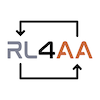RadiaSoft is developing machine learning methods to improve the operation and control of industrial accelerators. Because industrial systems typically suffer from a lack of instrumentation and a noisier environment, advancements in control methods are critical for optimizing their performance. In particular, our recent work has focused on the development of pulse-to-pulse feedback algorithms...
Despite the spreading of Reinforcement Learning (RL) applications for optimizing the performance of particle accelerators, this approach is not always the best choice. Indeed, not all problems are suitable to be solved via RL. Before diving into such techniques, a good knowledge of the problem, the available resources, and the existing solutions is recommended. An example of the complexities...
Reinforcement Learning (RL) has been successfully applied to a wide range of problems. When the environment to control does not exhibit stringent real-time constraints, currently available techniques and computational infrastructures are sufficient. At particle accelerators, however, it is often possible to encounter stringent requirements on the time necessary for an action to be chosen, that...
Reinforcement learning (RL), a subgroup of machine learning, has gained recognition for its astonishing success in complex games, however it has yet to show similar success in more real-world scenarios. In principle, the ability for RL to generalise past experience, act in real time, and its resilience to new states makes it particularly attractive as a robust decision-making support for...
Free energy-based reinforcement learning (FERL) using clamped quantum Boltzmann machines (QBM) has demonstrated remarkable improvements in learning efficiency, surpassing classical Q-learning algorithms by orders of magnitude. This work extends the FERL approach to multi-dimensional optimisation problems and eliminates the restriction to discrete action-space environments, opening doors for a...

